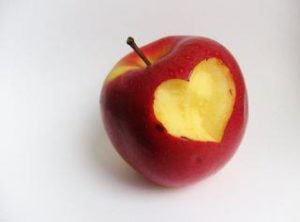Rosh Hashanah Feast Serves Up Symbolism
Jewish holidays like Rosh Hashanah are filled with rituals, tradition, and symbolism that nourish the body and the soul through food, and we’re not talking about brisket and matzo ball soup that always earn a spot on the menu.
The rich and abundant foods served on Rosh Hashanah are called simanim, which means “signs†or†indicators.†Like the special foods we eat at a Passover seder, simanim give us a taste of Jewish wisdom by directing us to improve ourselves and return to a life with more purpose and meaning. This idea of teshuva is what the High Holidays is all about, little did we know it tasted so good, with a dash of Yiddish pun.
So, let’s dig in! Continue reading
Yom Kippur–Holiest & Happiest Day of the Year
Tonight begins Yom Kippur, also known as the Day of Atonement, the holiest day of the year. Yom Kippur is a time for fasting, prayer, reflection, and repentance.
On Yom Kippur, more Jews pack the auditorium than any other time of the year, in fact, extra chairs are needed to accommodate the larger than usual crowds. Why? Is it because we have committed so many sins and need God’s forgiveness? Or because our Jewish guilt forces us to show up at temple least once a year (when actually joyous celebrations happen throughout the calendar)? Or is it because we want to see our friends and show off our new outfits? Or perhaps spending time in temple distracts us from our hunger pangs before we get to finally go home and break the fast with blintzes and bagels with creamed cheese.
While Yom Kippur is considered a solemn time with deep, genuine prayers, this high holiday is also the happiest day of the year. Think about it—Yom Kippur is all about opportunities and hitting the restart button, physically and spiritually. Through fasting, Yom Kippur is a time to detox (way before the body cleanse became a health trend), and it is a time to let go of baggage that has been weighing us down the previous year. Yom Kippur is a time to bow our heads in prayer, yes, but not hang our heads low because of past mistakes, failures, and shortcomings. Yom Kippur is a time to return to God who loves us no matter what and is pleased that we showed up, whether in a house of worship or in the apple orchard, or in our own minds.
If we are sincere in how we approach Yom Kippur, with an open mind, heart, and soul, willing to let go of the burdens that bring us down, forge ahead with a renewed sense of purpose, then Yom Kippur is a time to rejoice and begin a new year with a clean slate, a fresh start.
G’mar Hatima Tova, “May you be sealed in the Book of Life†for goodness, kindness, happiness, health and prosperity.
Rosh Hashanah Mezuzzah Symbolizes New Beginnings
When I think of the High Holidays, many traditional symbols come to mind—
the sound of the shofar, an instrument made of a ram’s horn that signals the awakening of the Jewish people. The short and long blasts of the shofar—tekia, sh’varim, teruah, and tekia gedolah—summon us to come together and renew our relationship with each other, ourselves, and, of course Hashem. Crisp apples dipped in honey tempt our taste buds for a sweet new year, while we try a new fruit to symbolize gratefulness for being alive and allowing us to enjoy all the delicious fruit of the creator. A favorite fruit on this holiday is the pomegranate for its biblical significance—the Land of Israel is known for its pomegranates and is one of the “seven species†for its abundant seeds (613 to be exact) associated with fertility and good deeds, specifically the 613 mitzvot in the Torah. Here’s a good way to seed a pomegrante!
Challah is eaten all year round on Shabbat, but on the High Holidays the braided loaf is made into a round shape that represents the crown of a king for it was on Rosh Hashanah, the birthday of mankind, the sixth day of creation, that Hashem was coronated as King of the Jewish people. Another symbolic ritual during the 10 Days of Awe is tashlich, meaning “casting off†our sins of the previous year by tossing pieces of bread or another food into a natural body of flowing water. Beautiful melodic prayers such as the Armaic words of Kol Nidre, meaning “all vows,” and Avenu Malkenu, “Our Father Our King,” stir our emotions as we dig deep into our soul, asking and granting forgiveness of others and ourselves to release burdens we carry and start anew.
This year, for the first time, another Jewish symbol was added to the High Holidays for my family. The mezuzzah that we hung in my son’s new apartment on the Sunday before Rosh Hashanah. Continue reading
Three Gifts I Learned at Rosh Hashanah
Rosh Hashanah, translated in Hebrew as “head of the year,†is a time to let go. As a new Empty Nester, letting go seems to be the theme of everything these days. We let go of our mistakes from the previous year, let go of shame we may be feeling, let go of sorrow for hurting someone, and, of course, ask for their forgiveness.
The Jewish New Year is also a celebrated time for new beginnings…a new school year, a new relationship with others, a new commitment to better ourselves, and a reawakening of Judaism and the Almighty.
Practicing Gratitude on Rosh Hashanah
Being grateful is a central theme of Judaism, especially on Rosh Hashanah when we take inventory of all the blessings in our lives. We turn to God and offer thanks for our abundance, even during the darkest times.
In one of the most recognized and quoted texts in Jewish thought, Pirke Avot (written around the year 200 CE), we learn “Who is rich? Those who rejoice in their own portion.â€
Rosh Hashanah Soul Searching–Will You Be Ready?
On this Rosh Hashanah, don’t just show up. Be ready!
The Jewish New Year, Rosh Hashanah, is unlike the celebration of the secular New Year because the resolutions we make are not only to ourselves but to God. Whereas a typical New Year’s resolution on the first of January might be to go the gym and lose a few pounds, the Jewish New Year is a time to really work up a sweat and ask God as our personal trainer to help make us stronger and a better person in the year ahead.







